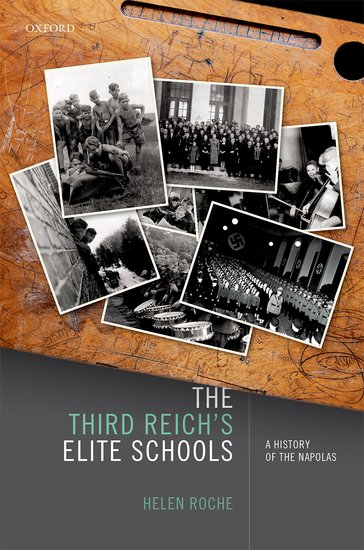Work
Zoom presentation, given to upper-level history pupils at St Andrew's School, Delaware, 21 April 2020.Read more...
 Masculinity and the German First World War Experience: A Secret History
Masculinity and the German First World War Experience: A Secret HistoryReview of Jason Crouthamel's An Intimate History of the Front: Masculinity, Sexuality, and German Soldiers in the First World War (Basingstoke: Palgrave Macmillan, 2014), in Reviews in History
In his classic thriller Greenmantle, first published in 1916, John Buchan describes his hero Richard Hannay's first encounter with his adversary, the German officer Colonel Ulrich von Stumm, in a fashion which hints at a hidden strain of sexual deviance within the German armed forces:Read more...
 The Third Reich's Elite Schools: A History of the NapolasBuy this item
The Third Reich's Elite Schools: A History of the NapolasBuy this itemDrawing on material from eighty archives in six different countries worldwide, as well as eyewitness testimonies from over 100 former pupils, this book presents the first comprehensive history of the Third Reich's most prominent elite schools, the National Political Education Institutes (Napolas / NPEA). The Napolas provided an all-encompassing National Socialist 'total education', featuring ideological indoctrination, premilitary training, and a packed programme of extracurricular activities.Read more...
Presented at an international conference entitled Writing Ancient History in the Interwar Period (1918-1939), Newcastle University, 24 January 2020.Read more...
 'Mussolini's Third Rome, Hitler's Third Reich and the Allure of Antiquity: Classicizing Chronopolitics as a Remedy for Unstable National Identity?'
'Mussolini's Third Rome, Hitler's Third Reich and the Allure of Antiquity: Classicizing Chronopolitics as a Remedy for Unstable National Identity?'Fascism: Journal of Comparative Fascist Studies, 8 (2), 2019, pp. 127-52.
While it is generally acknowledged that fascist movements tend to glorify the national past of the country in which they arise, sometimes, fascist regimes seek to resurrect a past even more ancient, and more glorious still; the turn towards ancient Greece and Rome. This phenomenon is particularly marked in the case of the two most powerful and indisputably ‘fascist’ regimes of all: Benito Mussolini’s Italy and Adolf Hitler’s Germany.Read more...
Presented at an international conference entitled Classics and the Spectacular under Fascism: Classical Performance in the ‘Ventennio Fascista, Ioannou Centre, University of Oxford, 16 December 2019.Read more...
 'Die Klosterschule Ilfeld als Nationalpolitische Erziehungsanstalt'
'Die Klosterschule Ilfeld als Nationalpolitische Erziehungsanstalt'in Die Klosterkammer Hannover 1931-1955: Eine Mittelbehörde zwischen wirtschaftlicher Rationalität und Politisierung, ed. Detlef Schmiechen Ackermann et al., Göttingen (Wallstein), 2018, pp. 605-26.
This chapter delineates the history of the Klosterschule in Ilfeld, and its transformation into a Nationalpolitische Erziehungsanstalt (Napola). The Klosterkammer Hannover's role in the running of the school and its support of the Napola after 1935 is explored, as well as its involvement with other putative Napola foundation projects.Read more...
Presented at an international conference entitled Is Europe Inclusive? Politics, Discourses and Practices, Radboud Universiteit, Nijmegen, 14 November 2019.Read more...
Presented at the 11. Wissenschaftliches Symposium: Demokratie und Diktatur in Deutschland aus britischer Sicht, Kreismuseum Wewelsburg, 14 September 2019.Read more...
 'The Peculiarities of German Philhellenism'
'The Peculiarities of German Philhellenism'The Historical Journal 61 (2), 2018, pp. 541-60.
Studies of German philhellenism have often focused upon the idealization of Greece by German intellectuals, rather than the political relationship which existed between contemporary Germans and the Greek state from the Greek War of Independence onwards. This review essay explores the extent to which recent research affirms or rebuts the notion of a Hellenophile Sonderweg when interpreting the vicissitudes of the Graeco–German relationship.Read more...
